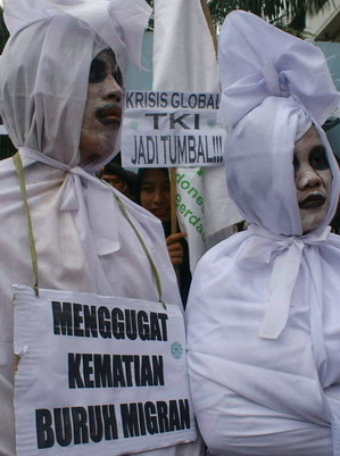Alex Ong
Indonesian protestors in MalaysiaCourtesy of Migrant Care |
The migrant worker section of the Indonesian Embassy in Kuala Lumpur used to resemble an Indonesian bus terminal, replete with hawkers and littered with rubbish. Outside, the grounds were effectively a marketplace where middlemen operated one-stop service counters, offering Indonesian migrant workers quick access to consular services at a price.
But things began to change in 2006 after President Susilo Bambang Yudhoyono promised crowds of Indonesian migrant workers in KL that the government would clean up its act. The chaos has been replaced by an effective queuing system, aided by posters that explain precisely what procedures need to be followed when applying for documents. There are loud-speaker announcements for all to hear how it is costly and illegal to use middlemen. And now the embassy even has a one-day policy for processing migrant workers' documents.
Improving access to consular services is only one part of the puzzle, as migrant domestic workers are not covered by labour law. The embassy tries to force employers to sign employment contracts to give Indonesian domestic workers legal standing in case their employers abuse their labour rights. But corrupt embassy officials still process migrants' documents without sighting contracts. As a result, many Indonesian domestic workers receive less than the RM 500 per month demanded by Jakarta. Indonesian domestic workers are also denied weekly rest days. The government has made serious attempts to deal with these problems but with little success so far.
Protracted negotiations
Since June 2009, the Indonesian government has been in serious negotiations with its Malaysian counterpart. They're taking a long time because the two sides just can't agree on what rights Indonesian domestic workers should have. Indonesia wants Malaysia to give them basic labour rights. They've asked for a day off each week and a minimum salary. They also want to give Indonesian domestic workers the right to keep their own passports. Meanwhile, Malaysia remains adamant that employers should continue to keep migrants' passports under lock and key until bosses have recouped agent fees from the migrants' wages.
The role of agents is the main sticking point though. Agents have been able to establish a monopoly on bringing Indonesians in because the system forbids employers to recruit workers themselves. This means that the agents are able to decide who pays for the cost of recruitment and how. As the least powerful actors in the process, these costs normally fall to the migrants themselves. But migrants don't want - or are unable - to pay this cost up front, so agents make employers pay and tell them to deduct the cost from their workers' wages. This is why employers want to keep migrant workers' passports as security.
Agents have been able to establish a monopoly on bringing Indonesians in because the system forbids employers to recruit workers themselves
In theory, migrants whose passports have been retained are forced to think twice before ditching their employers in search of better opportunities. But in fact, many still choose to run away. By doing so, they risk getting caught by Malaysia's frequent raids targeting illegal migrants, and thus face the threat of imprisonment, deportation, or even physical punishment such as caning.
The Indonesian government had conceded the right for Malaysian employers to hold Indonesians' passports in an earlier memorandum of understanding. But now it is trying to have this memorandum overturned. To get what it wants - and to deal with pressure from migrant workers' groups and the international community - Indonesia has imposed a moratorium on the sending of domestic workers to Malaysia.
Moratoriums simply don't work
By December 2009 the official figure of Indonesian domestic workers had decreased from 320,000 to 230,000. But in reality, migrant workers just kept coming. Part of this is due to an increase in human trafficking activities, made worse by the fact that it involves powerful officials in both countries. On the Malaysian side, the government even started permitting certain agencies to convert social visit visas into domestic worker permits to help overcome the sudden shortage of supply of documented migrant workers.
But others are sent by agents regardless of the ban. This is possible because a lot of Malaysian agents own an Indonesian agency, which means that they can get access to Indonesian workers without having to bargain with an independent partner, who might care more about what the Indonesian government says it should do. At the Indonesian end, these agents get around the moratorium by taking advantage of opportunities offered by corrupt Indonesian officials, who are happy to sell backdated government documents to show that migration happened before the ban. Once the agents have these papers it's simply a matter of sending workers as usual.
Immigration officials need to be bribed to let the migrants out. But once they've crossed the border, there's nothing much that the Indonesian government can do except to go back to the negotiating table. In the meantime, Indonesian domestic workers are left with little prospect of improving their conditions, let alone gaining recognition - or protection - under Malaysian labour law.
Alex Ong (alexmigrantcare@gmail.com) is the Malaysia Country Director of Migrant Care.



